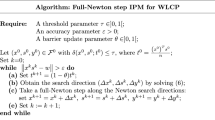Abstract.
This paper describes several methods for solving nonlinear complementarity problems. A general duality framework for pairs of monotone operators is developed and then applied to the monotone complementarity problem, obtaining primal, dual, and primal-dual formulations. We derive Bregman-function-based generalized proximal algorithms for each of these formulations, generating three classes of complementarity algorithms. The primal class is well-known. The dual class is new and constitutes a general collection of methods of multipliers, or augmented Lagrangian methods, for complementarity problems. In a special case, it corresponds to a class of variational inequality algorithms proposed by Gabay. By appropriate choice of Bregman function, the augmented Lagrangian subproblem in these methods can be made continuously differentiable. The primal-dual class of methods is entirely new and combines the best theoretical features of the primal and dual methods. Some preliminary computation shows that this class of algorithms is effective at solving many of the standard complementarity test problems.
Similar content being viewed by others
Author information
Authors and Affiliations
Additional information
Received February 21, 1997 / Revised version received December 11, 1998¶ Published online May 12, 1999
Rights and permissions
About this article
Cite this article
Eckstein, J., Ferris, M. Smooth methods of multipliers for complementarity problems. Math. Program. 86, 65–90 (1999). https://doi.org/10.1007/s101079900076
Issue Date:
DOI: https://doi.org/10.1007/s101079900076




